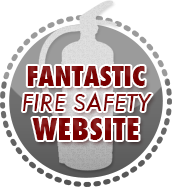Fire Extinguisher : 101
Fire Hazards (Fire Prevention Tips)
| Home |
| About Fire Extinguishers |
| Using a Fire Extinguisher |
| Fire Prevention |
| Fire Hazards |
| First Aid for Fire |
| Financial Protection |
| Biggest Fires in History |
| Firefighters |
This site was voted:

by onlinefiresciencedegree.org
(scroll to 74 on the list)
This page is intended to provide individuals with general information pertaining to knowing dangerous fire hazards and the importance of owning a fire extinguisher. |
The National Fire Protection Association overall fire statistics in 2009 reported that 85% of fire deaths occured in the home, making fire prevention a top priority in every home.
Here is a list of some of the less obvious tips for fire prevention, based on the most common causes of fires:
Cooking equipment
Cooking is the number one cause of home fires.
- Keep appliances clean, and wipe surfaces after spills. Clean stove surfaces and ovens regularly.
- Wear tight-fitting sleeves, or roll them up when cooking
 Keep
flammable objects, including pot holders, dish towels and curtains,
at least three feet away from the stove.
Keep
flammable objects, including pot holders, dish towels and curtains,
at least three feet away from the stove. - Wood and coal stoves, fireplaces, chimneys, and all other solid-fueled heating equipment needs to be inspected annually by a professional and cleaned accordingly.
- Assure microwaves have enough room to breathe, that all the vents are cleared of obstructions.
- If there is a microwave fire, keep the door closed and unplug the microwave. Make sure to have the microwave oven serviced before you use it again.
- If there is an oven fire, keep the door closed and turn off the heat. If the fire doesn't go out immediately, call the fire department.
- A grease fire occurs when oil or greasy foods are heated and ignite. The simplest way to fight a grease fire is to carefully slide a lid over the pan. Turn off the burner, don't move the pan, and keep the lid on until the pan cools completely. Baking Soda may also be used to suffocate the fire. NEVER PUT WATER ON A GREASE FIRE. Water causes the grease to splatter and the fire to spread. Also, NEVER attempt to take a grease fire outdoors. It will be too hot to carry and you will drop it, causing a major house fire.
Read more about kitchen fire safety.
Heating Equipment
Heating equipment is the leading cause of home fires during the winter months of December, January and February, and is the second-leading cause of home fires year-round.
 |
|
Electrical Distribution Equipment
Wiring, outlets, switches, circuit breakers and other electrical devices are the third leading cause of home fires and the second leading cause of fire deaths.
 Replace
or repair loose or frayed cords on all electrical devices.
Replace
or repair loose or frayed cords on all electrical devices. - If outlets or switches feel warm, shut off the circuit and have them checked by an electrician.
- Try to avoid extension cords. If you feel an extension cord is necessary, make sure that it is not frayed or worn. Do not run it under carpet or around doorways.
- Never overload a socket. The use of "octopus" outlets or "power bar", outlet extensions that accommodate several plugs, is strongly discouraged. Try to limit one high-wattage appliance into each individual outlet at a time.
- If a circuit breaker trips or a fuse blows frequently, cut down on the number of appliances on that line. In many older homes, the capacity of the wiring system has not kept pace with today's modern appliances and can overload electrical systems. Some overload signals include: dimming lights when an appliance goes on, fuses blowing frequently or shrinking TV picture.
- Assure there's plenty of air space around home entertainment units such as the TV and stereo to avoid overheating.
Although some fires are caused by electrical system failures and appliance defects, many are caused by the misuse and poor maintenance of electrical appliances, incorrectly installed wiring, and overloaded circuits and extension cords. Read more about Electrical Fire Safety.
Smoking
Smoking is the leading cause of home fire deaths in the United States.
 |
|
More to think about
- Get rid of stored newspaper or other unnecessary materials. Newspapers stored in a damp, warm place may ignite spontaneously.
- Install smoke detectors on every level of your home and outside of sleeping areas.
- Mount a fire extinguisher in the kitchen, garage and workshop.
- Agree in advance on an escape plan. There should be at least two exits in every room.
Note: Half of all home fire deaths occur at night, so fire hazard checks and special attention to fire prevention should occur before going to bed.
Holiday
Fire Safety
Fires during the holiday season injure approximately 2600 people
and cause over $930 million dollars in damage annually. So, while you
are busy wrapping, carolling, and baking Christmas cookies, take some
time to ensure that you have taken the proper steps towards Christmas
fire safety. Read more about holiday
safety.